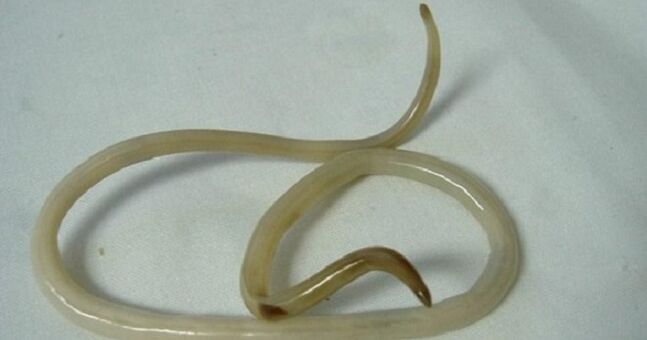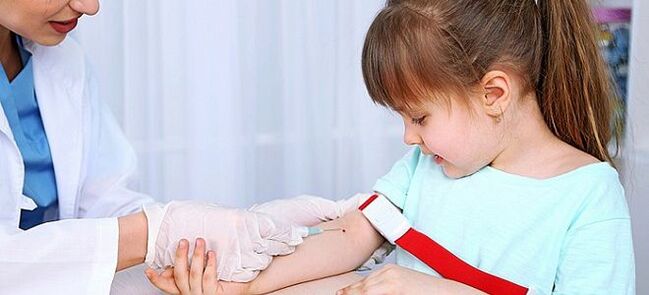
Everyone can get parasitic infections, but babies are especially affected by them, and in the summer the risk is especially high. There are many different types of worms, but they all have adverse effects on health. Parents should know what worms in children are - we'll look at the symptoms and treatment of such a disease as helminthiasis below.
Types of worms in humans
There are 12, 000 worms on our planet (they are also known as helminths). They live in soil, food and animals, while about 200 varieties can live in the human body. Parasites always have to have a host and often choose young as a place of residence. As a child gets used to the world, he gets a taste of everything he has at hand, so they are often at risk.
The most common worms in children are roundworms or roundworms. Including:
- Roundwormcause roundworm disease. Large helminths, which can be up to 40 cm long, parasitize the gastrointestinal tract and small intestine.
- Pinwormcause worms. The caterpillars are small (less than 1 cm long) and yellow-white in color. Such helminths live in children in the cecum or small intestine. Their life cycle is up to 4 weeks.
- Rose- These are tapeworms that parasitize the intestines and various organs. Helminths cause diseases such as meningitis, peritonitis, airway infections, teniarinhoz and diphyllobothriasis.
- Trematodosesare flatworms or tapeworms. These include cat flukes, paradoxical leukochloridium, and schistosomes. The parasite causes diseases such as cysticercosis and fascioliasis.
How worms are transmitted?
According to official health statistics, 80% of filariasis cases are in children under 2 years of age and preschool children attending educational institutions. These official figures are registered in babies who have undergone laboratory tests. Worms use all kinds of ways to enter the human body. The most common routes of infection are:
- dirty hands or contact with infected animals;
- poorly washed fruits or vegetables;
- water;
- poorly processed fish or meat.
How to understand that the child has a worm infection?
To answer the question of helminths in children (symptoms and treatment are determined by the type of helminth), you need to know how the infection occurs and which internal organs are invaded by the parasites. . Usually they do not manifest in any way, and the disease is advanced in a latent form, so the doctor cannot always determine their presence. Worms live in the human body for years, even decades, they are adapted to the most adverse conditions.
Common signs of worm disease in children can include the following:
- nausea in the morning;
- anal itching;
- headache;
- teeth grinding - is grinding teeth in a dream;
- excessive salivation at night;
- dizzy;
- nasal polyps;
- inflammation of the genital organs;
- period pain around the navel;
- sheep manure, diarrhea or constipation;
- loss of appetite;
- pallor of the skin.
If you find more than five of the listed symptoms in your child, then you should suggest a worm infestation. Each person can be a carrier of many different types of worms that parasitize in the body, leading to drunkenness and serious illness. With the activation of the parasite, the signs can change. When you suspect worms in children, symptoms may also appear in the external signs:
- "chicken" (rash) on the thighs or forearms;
- dark spots and dark circles under the eyes;
- early tooth decay;
- lack of body weight;
- fragility of nails and hair;
- growth disorders;
- allergic reaction.
Worms in children can affect the nervous system:
- the infant becomes irritable;
- reduced ability to focus attention;
- lost perseverance;
- disturbed sleep.
What do worms look like in children's stool?
Very often, young parents are interested in the question of how to detect worms in the stool of a child. In fact, only large worms can be seen in the feces of children. Parasites leave the body in clumps, of which there are only a few individuals. If you see foreign matter, it is better to contact a specialist and do tests to rule out the presence of parasites.
Test for worms in children
When parents suspect worms in children, the symptoms and treatment depend on the stage of the disease. For a definitive diagnosis, you need to take your child to a pediatric gastroenterologist. The doctor conducts the initial examination and prescribes the examination including:

- enzyme immunoassay - helps to recognize the type of worm and its presence, so blood is taken from the child's veins on an empty stomach;
- blood test for helminths in a child - the main indicators are: the number of eosinophils, the presence of anemia and color indicator;
- scraped, applied for filariasis - taken from the anus;
- The meta-analysis of faeces for eggs and filariasis was carried out in 3 stages, because some worms do not lay eggs regularly;
- Computed tomography, X-ray or ultrasound - is done to detect the presence of worms in the human body.
Children with worms - what to do?
After the diagnosis is confirmed, the doctor prescribes the treatment of worms for the child, the drugs need to be strictly agreed with the doctor), talks about folk methods and the products that should be used to get rid of the disease quickly. Parents should know that it is not possible to give medicine to a child on their own because this can lead to irreversible consequences and thereby make the child's condition worse.
If you do not know how to deworm your child, then contact a specialist, they will write you several stages of therapy. These include:
- preparation of the body - in this case, sorbents and antihistamines are prescribed;
- deworming therapy - traditional medicine for parasites, which can be in the form of tablets, suppositories or suspension;
- cleansing the body - enemas, diuretics or sorbents.
Treatment of worms in children is carried out at home, if there are no complications in the form of infectious lesions. During the time the child must follow a special diet. After the first course of treatment, the child was re-examined and tested. If they again show the presence of parasites in the body, then drugs are prescribed again.
Deworming tablets for children
Currently, there are several drugs that help with deworming. They are available in tablets and for babies. Before use, consult a specialist.
Suspension of deworming for children
If your child is still young and does not know how to take the medicine, the suspension is specially designed for him.
Folk medicine for worms for children
With the help of traditional medicine, it is not possible to completely get rid of the parasites, but you can increase immunity and speed up treatment. Deworming for children should be done carefully and only with the approval of a doctor. The most popular products are:
- garlic;
- Pumpkin seeds;
- carrot juice;
- vegetable oil;
- infusion of celandine and wormwood or tansy.
Worm prevention for children
All parents should know that deworming drugs for children for prevention can be used to create a special microflora in which helminths cannot survive.
To avoid infection, you must:
- Observe the rules of personal hygiene.
- Wash hands with soap and water after using the toilet and walking.
- Anti-flies.
- Keep pacifiers and toys clean.
- Iron and linen clothes.
- Handle food with care.
Depending on the age of the baby, the way to prevent worms for children is different, starting only from 6 months of use.























